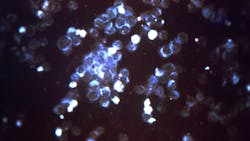Pfizer granted FDA breakthrough therapy designation for respiratory syncytial virus vaccine
Pfizer Inc. announced that its respiratory syncytial virus (RSV) vaccine candidate, PF-06928316 or RSVpreF, received Breakthrough Therapy Designation from the U.S. Food and Drug Administration (FDA) for the prevention of lower respiratory tract disease caused by RSV in individuals 60 years of age or older, according to a news release.
The FDA decision is primarily informed by the positive results of a proof-of-concept, Phase 2a study evaluating the safety, immunogenicity, and efficacy of a single dose of 120µg RSVpreF in a human viral challenge model in healthy adults 18 to 50 years of age.
In September 2021, Pfizer announced the initiation of RENOIR (RSV vaccine Efficacy study iNOlder adults Immunized against RSV disease), a Phase 3 clinical trial (NCT05035212) evaluating the efficacy, immunogenicity, and safety of a single dose of RSVpreF, in adults ages 60 years or older. This study remains ongoing.
The FDA’s Breakthrough Therapy Designation is designed to expedite the development and review of drugs and vaccines that are intended to treat or prevent serious conditions and preliminary clinical evidence indicates that the drug or vaccine may demonstrate substantial improvement over available therapy on a clinically significant endpoint(s).
Burden of RSV
RSV is a contagious virus and a common cause of respiratory illness. The virus can affect the lungs and breathing passages of an infected individual and can be potentially life-threatening for young infants, children with chronic medical conditions, and older adults. In the United States alone, among older adults, RSV infections account for approximately 177,000 hospitalizations and 14,000 deaths each year. For children younger than five years old in the U.S., approximately 2.1 million outpatient visits and 58,000 hospitalizations occur each year.
RSV is a disease for which there are currently no prophylactic, therapeutic, or vaccine options for older adults and the medical community is limited to offering only supportive care for adults with the illness.
Pfizer’s investigational RSV vaccine candidate builds on foundational basic science discoveries including those made at the National Institutes of Health (NIH), which detailed the crystal structure of prefusion F, a key form of the viral fusion protein (F) that RSV uses to attack human cells. The NIH research showed that antibodies specific to the prefusion form were highly effective at blocking virus infection, suggesting a prefusion F-based vaccine may confer optimal protection against RSV. After this important discovery, Pfizer tested numerous versions of the viral protein, and identified those that elicited a strong anti-viral immune response in pre-clinical evaluation. The vaccine candidate is composed of two preF proteins selected to optimize protection against RSV A and B.
Earlier this month, Pfizer announced RSVpreF received Breakthrough Therapy Designation from the U.S. Food and Drug Administration (FDA) for the prevention of RSV-associated lower respiratory tract disease in infants from birth up to six months of age by active immunization of pregnant women. The FDA designation was informed by the results of the Phase 2b proof-of-concept study of RSVpreF (NCT04032093), which evaluated the safety, tolerability, and immunogenicity of RSVpreF in vaccinated pregnant women ages 18 through 49 and their infants.
